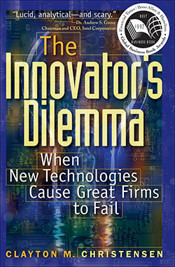The Innovator’s Dilemma: The Revolutionary Book that Will Change the Way You Do Business

This book is a legendary examination of how companies handle “innovation,” by which the author means new aspects of their business that come out of nowhere and eventually come to dominate their markets.
The problem: you can’t just give customers what they ask for. Because lots of customers actually don’t know what they need, and they have little ability to project alternative solutions for their problems. Customers are often blinded by what the market has told them they want.
So if your company just listens to customers and responds to what they say, some other company is going to think around the customer’s problem and deliver a solution that they had no idea they really wanted, and you’re going to get left behind. This is made harder by the simple fact that you can’t examine or analyze a market that doesn’t exist, so you have to guess what’s around the corner – this is “the innovator’s dilemma.”
This book is dense. The author is a professor at Harvard Business School, and the book is a product of his research there. It’s not just his opinions – it summarizes quite a bit of primary market research. I’m a relatively smart guy, and I had trouble following some of it (a lot of it…).
He dissects the hard disk drive market as an extended case study, and explains how some vendors were slow to respond to reductions in form factor because their customers weren’t asking for smaller drives, so the customers were blinded to the market possibilities they enabled. He does the same thing with some other markets, like earth excavators where he examines why some vendors made the jump to hydraulics and other stayed with cable actuation.
If you get confused during the book (I did), there are “Book Group Discussion” summaries and questions at the back which are very, very helpful. This is one of those books that you almost need to read in a group. I understand this is assigned reading in many MBA courses, which makes sense.
Book Info
- I have read this book. According to my records, I completed it on .
- A softcover copy of this book is currently in my home library.